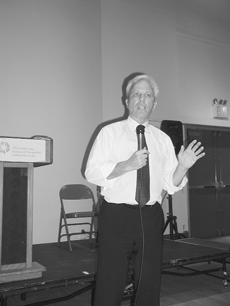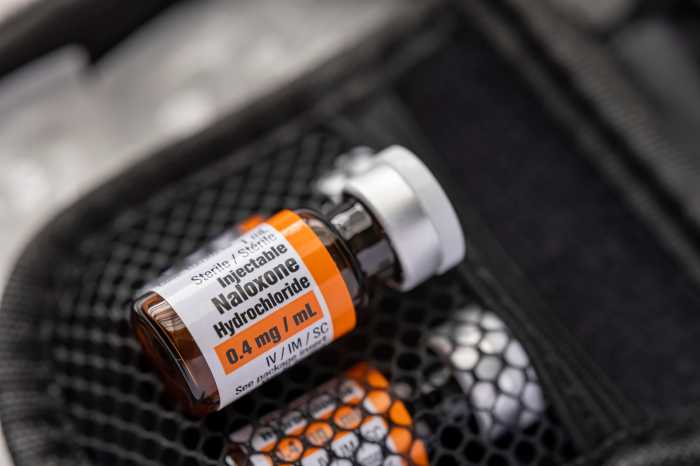AG hopeful, ex-NYC public advocate, pushes LGBT issues to help overcome Cuomo
If Mark Green’s run for New York State Attorney General is his last hurrah—although that may be unlikely given his history—he is at least going to go down swinging. Trailing in the polls to Andrew Cuomo, the city’s ex- public advocate slashed at the former Clinton administration housing secretary in what may turn out to be their only debate in mid-August, denigrating Cuomo’s service and credentials He also did something that Cuomo and out gay candidate Sean Patrick Maloney have refused to do—he ruled out defending the state’s marriage law because it excludes same-sex nuptials.
“I’d represent the state unless I felt the case had no statutory, constitutional, or moral basis,” he said. “There is no moral basis to deny people of the same-sex the same blessings of marriage that my wife and I enjoy.”
Charlie King, who is at five percent in the polls as is Maloney, took a similar position. Cuomo and Maloney insist—like the current occupant of the office, Eliot Spitzer—that the attorney general is always obligated to defend the state in court, even though some of Spitzer’s predecessors did not. Notably, former Attorney General Robert Abrams, now chairman of Citizens Union, refused to defend the state’s sodomy law in 1980, leaving that job to a Buffalo prosecutor, and the statute was overturned by a more liberal Court of Appeals than the one that just ruled against marriage rights for same-sex couples.
Gay City News spoke with Green on Sunday just after he got the nod of The New York Times, a key endorsement in a Democratic primary here and one that has energized him despite polls that last week had him behind Cuomo 48 to 35 percent.
Both Cuomo and Green, the leading candidates, are on the record supporting equal rights for LGBT folks including marriage equality, so comparisons between the two get down to subtleties of leadership on the issues. In his aborted run for governor in 2002, Cuomo resisted coming out for same-sex marriage, supporting only civil unions. When pressed, he did say “Marriage should be the goal,” but would not flatly support it. Now, like the state Democratic Party, he does.
Reporters at LGNY, the newspaper from which the editorial team at Gay City News came, started asking public officials where they stood on same-sex marriage back in 1996 after a promising, pro-gay preliminary marriage ruling from Hawaii’s Supreme Court case triggered Congress to pass—and President Bill Clinton to sign—the Defense of Marriage Act, banning federal recognition of same-sex marriages and allowing states not to recognize legal same-sex marriages performed elsewhere.
Among leading New York political leaders at that time, Alan Hevesi, who was the city comptroller and now holds that position for the state, was the first to declare his support, followed by then-Manhattan Borough President Ruth Messinger, the 1997 Democratic mayoral nominee, then-Bronx Borough President Freddy Ferrer, the 2005 nominee, and the Reverend Al Sharpton. Public Advocate Mark Green would only say that he opposed DOMA—a position that he stuck with in 1998 when he ran unsuccessfully for the Democratic U.S. Senate nomination won by Chuck Schumer, who had voted for DOMA as a Brooklyn congressman. Spitzer was first elected attorney general in 1998 as a supporter of the right of gay people to marry.
In 1999, Green, having lost a statewide race, changed his posture, declaring his support for same-sex marriage in the run-up to his 2001 bid for mayor, a race he lost to Michael Bloomberg, who expressed nothing but confusing positions on marriage equality until early 2005, when he voiced his support the very same day he announced he was appealing the only positive same-sex marriage ruling to come out of New York’s courts.
Despite saying he would not defend the state’s exclusionary marriage law in the future and chastising Court of Appeals Judge Robert Smith for his plurality opinion upholding the status quo, Green would not criticize Spitzer for successfully making the state’s case this past spring. That is noteworthy given that the July Court of Appeals ruling may well be the last time the issue is put to the state attorney general.
Green’s public advocacy for LGBT rights is arguably deeper than his opponents’—though King did voice support for marriage equality earlier. While his primary reputation is as a consumer advocate going back to his days as a Nader’s Raider, Green publicly testified for the city lesbian and gay rights law in 1986 when it passed after a 15-year struggle, regularly participates in the annual Pride Marches down Fifth Avenue, and has consistently boycotted parades that exclude LGBT contingents such as those on St. Patrick’s Day and Pulaski Day.
Asked what he is most proud of accomplishing on LGBT and AIDS issues, Green cited his work in the early 1990s as Mayor David Dinkins’ consumer affairs commissioner, when he went after “companies engaged in AIDS scams selling fake remedies,” and exposed how a leading AIDS drug, pentamidine, “was costing four times here what it was in Europe.” The drug is used to treat Pneumocystis carinii, a rare form of pneumonia that was at the time killing many people with AIDS. Green’s high profile advocacy forced a reduction in the price for the drug, at a time when many were struggling to afford the few effective AIDS treatments available.
Green also recalled taking on a fellow Democrat, who is now a Bronx state senator.
“When the Reverend Ruben Diaz, Sr., slandered the entire gay community by saying we should not have the 1994 Gay Games here because it would spread AIDS, I had Diaz’s article translated from Spanish exposing him.” By then the public advocate, Green endorsed calls for Diaz’s removal from the Civilian Complaint Review Board that oversees the police department.
“I attended those Games with my seven-year old son,” Green recalled.
The Democrat is also proud of his first full day on the job as public advocate in 1994, when he joined “a picket at City Hall to lend my public support to the fight against Mayor Giuliani’s attempt to eliminate the Division of AIDS Services,” the first public step in a successful effort led by Housing Works.
Looking ahead, Green was cautious about taking stands on some of the controversial AIDS bills coming before the state Legislature. Regarding city Health Commissioner Thomas Frieden’s bill that would end the requirement that those tested for HIV give their written consent—a measure that drew widespread opposition from community advocates at a series of town hall meetings earlier this year—Green would only say that that he would have to “look carefully” at it, citing the need for the state’s highest law enforcement officer to be scrupulous in offering a legal opinion. Green was also noncommittal about Spitzer’s proposal that rape suspects be tested for HIV, an approach similarly criticized by AIDS advocates—including the Gay Men’s Health Crisis which several years ago argued that a one-time test of an alleged perpetrator is not dispositive and that a rape victim should instead focus on initiating prophylaxis treatment within 72 hours and following up with testing of their own.
Summarizing his appeal for votes, Green said, “None of the other three candidates have close to my experience” and that he wants to be an attorney general in the “Abrams-Spitzer tradition.”
A lot of heavyweight gay and lesbian leaders, including City Council Speaker Christine Quinn and State Senator Tom Duane, have gone for Cuomo, who has become something of the darling of the Democratic establishment. Green is hoping that his record and longstanding gay activist allies—including lobbyist Ethan Geto, who chaired Howard Dean’s 2004 campaign in New York, and Allen Roskoff, founder of the Jim Owles Liberal Democratic club—coupled with this past weekend’s Times endorsement, will vault him to an underdog win on September 12.
gaycitynews.com


































